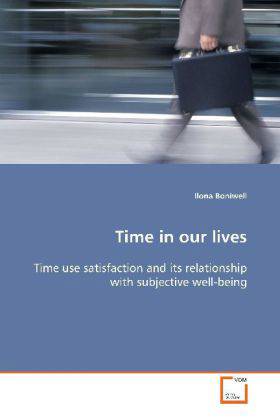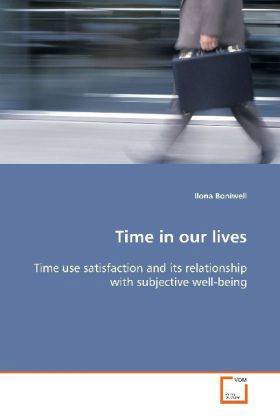
- Afhalen na 1 uur in een winkel met voorraad
- Gratis thuislevering in België vanaf € 30
- Ruim aanbod met 7 miljoen producten
- Afhalen na 1 uur in een winkel met voorraad
- Gratis thuislevering in België vanaf € 30
- Ruim aanbod met 7 miljoen producten
Zoeken
Time in our lives
Time use satisfaction and its relationship with subjective well-being
Ilona Boniwell
Paperback | Engels
€ 67,45
+ 134 punten
Omschrijving
Much research on time use has been based on
assumptions about clock and calendar time. Less is
known about how people experience their time use,
what makes people satisfied with their time use and
about the nature of the relationship between the use
of time and well-being. This work addresses these
questions though literature reviews of well-being
and time-use and two empirical studies. These studies
highlight a number of factors contributing to
satisfaction with time use previously ignored or
under-researched in the time use literature,
including motivation for time use activities,
perceived balance in time allocation, taking
responsibility for one''s time, and the sense of
achievement. The findings suggest that in terms of
satisfaction with time use, time use interventions
might be more helpful if focused more on
psychological aspects of time use, and less on time
management techniques. They also indicate that the
extent to which one is satisfied with time use may
have important implications for their well-being.
assumptions about clock and calendar time. Less is
known about how people experience their time use,
what makes people satisfied with their time use and
about the nature of the relationship between the use
of time and well-being. This work addresses these
questions though literature reviews of well-being
and time-use and two empirical studies. These studies
highlight a number of factors contributing to
satisfaction with time use previously ignored or
under-researched in the time use literature,
including motivation for time use activities,
perceived balance in time allocation, taking
responsibility for one''s time, and the sense of
achievement. The findings suggest that in terms of
satisfaction with time use, time use interventions
might be more helpful if focused more on
psychological aspects of time use, and less on time
management techniques. They also indicate that the
extent to which one is satisfied with time use may
have important implications for their well-being.
Specificaties
Betrokkenen
- Auteur(s):
- Uitgeverij:
Inhoud
- Aantal bladzijden:
- 200
- Taal:
- Engels
Eigenschappen
- Productcode (EAN):
- 9783639109542
- Uitvoering:
- Paperback
- Afmetingen:
- 150 mm x 220 mm
- Gewicht:
- 282 g

Alleen bij Standaard Boekhandel
+ 134 punten op je klantenkaart van Standaard Boekhandel
Beoordelingen
We publiceren alleen reviews die voldoen aan de voorwaarden voor reviews. Bekijk onze voorwaarden voor reviews.







